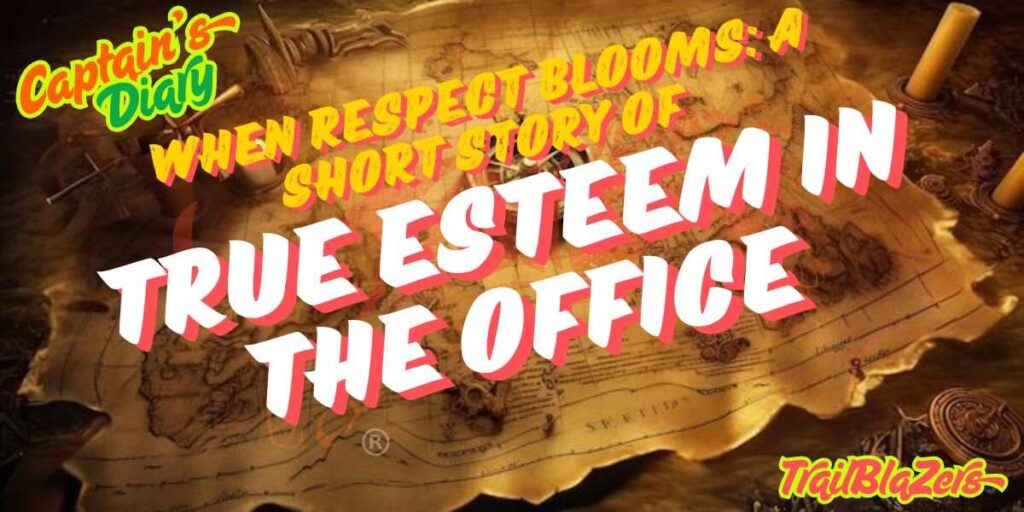When Respect Blooms: A Short Story of True Esteem in the Office.
I thought respect was a gift I earned with my deeds. I believed my raises.

Intro:
I thought respect was a gift I earned with my deeds. I believed my raises, the nods in meetings, and the quiet smiles in the breakroom proved my worth.
But respect is not a mirror reflecting one’s glory. Respect is a mirror reflecting one’s character.
Only later did I learn that those who truly command respect give it freely—to everyone, strong or frail.
Story start at KL:
I arrived at the office before dawn. The streets of Petaling Jaya lay empty, bathed in the soft glow of streetlamps. I walked past the mamak shop across the street, its doors still closed, the waft of sambal and fried dough yet to fill the night air. I liked the quiet hour before the day’s bustle. It reminded me of mornings before I learned to chase approval.
Inside the building, I tapped in. My ID card blinked green. I took the elevator to the twelfth floor. The hum of the air-conditioner was the only sound. I settled at my desk. A cup of kopi O strong enough to wake the dead sat on the blotter. I opened my laptop. The world of emails and charts awaited.
1. The Crowning Achievement
Six months ago, I had led a project that transformed our team’s efficiency. We cut report times in half. The CEO herself had commended me in a town-hall meeting. I watched her lips curl into a smile as she spoke my name. My chest swelled. I felt respect, bright and warming, settle into my bones.
After that, I walked taller. I saw the way colleagues stepped aside to let me pass in the pantry. I heard the hush of voices when I entered a meeting room. I thought: I am respected because I am excellent.
2. The First Lesson: A Quiet Observer
Then she arrived. Nadia was new. She joined as a junior analyst just weeks before my big project wrapped. She was quiet and kept her head down. On her first day, I found her minding the coffee machine at eight in the morning, pouring latte for the cleaning staff and security guard who arrived before me. She greeted each by name, asked about their families. She pressed the cup into their hands with gentle courtesy.
I watched. I thought: she must crave attention. She was building alliances. She was buttering up the team, just like I used to do.
Yet when I walked into the pantry for my customary second cup, the security guard winked at me. “You’ve got a friend in Nadia,” he said. “She greets me like I’m family.”
I bristled. “She’s new,” I replied. “She’s just being nice.”

3. The Rising Heat
That day, I watched her in meetings. She listened more than she spoke. When she did speak, her words were thoughtful—soft but firm. She asked a question about risk management that nudged our director to clarify a plan I had assumed was clear. That exchange made the whole team recalibrate our approach.
Afterward, the director patted her on the shoulder. “Good point, Nadia,” he said. The room nodded. Even I, the project lead, felt the quiet sting of being upstaged.
That night I rode my motorcycle home. The city lights blurred. I asked myself: why do I feel uneasy? I was the star. I led the team. And yet here was someone newer, someone quieter, earning respect.
4. The Second Lesson: Respecting the Weak
Two weeks later, a vendor dispute blew up. Supplies were late, costs were rising, and everyone looked to me. I presented data, diagrams, charts—my tools of triumph. But the vendor’s excuse was that our purchase order had a typo. Minute but fatal. We paused. We missed the deadline.
Nadia approached me after the call. She held a notebook. She said, “I think the PO was misplaced. I saw a draft in Finance’s inbox.”
I frowned. “You found the misplaced draft?”
She nodded. “I thought you should know.”
I held her gaze. Then I thanked her—but inside I felt small. I realized: respect for the strong is admiration—they stand tall. But respect for the vulnerable, for those who admit mistakes, who help quietly—that is charity. It flows from recognition of our shared frailty.
5. Shadows and Lights
I began to watch Nadia differently. She stayed late one evening to help a colleague analyze spreadsheet errors. She stayed even later to console another who had lost a family member. She never boasted. She never looked for praise. She simply sat, listened, and offered help.
I asked her once: “Why do you do all this—helping everyone, even when no one asks?”
She smiled, as if I had asked a curious but obvious question. “Isn’t that what kindness is?”
I thought: I had mistaken her humility for weakness. In her humility lay her strength. She was building respect not by seeking it, but by giving it.

6. The Third Lesson: Respecting Everyone
Soon, the office buzz changed. The junior staff began greeting me by name. Colleagues from other departments dropped by my desk with project suggestions. Even the security guard gave me an extra piece of kuih at lunch. I wondered why. I had led the big project. I was the champion. Yet new respect bloomed only after I learned from Nadia.
At the next town-hall meeting, the CEO asked me to speak about teamwork. I told the story of a junior analyst who taught me a greater lesson than any project metric: that respect is not a trophy reserved for the victorious. It belongs to all.
The room was silent. Then a smattering of applause. I met Nadia’s eyes. She nodded. I realized respect is a cycle: when you give it, it returns.
7. A Quiet Transformation
I began practicing respect daily. I greeted the security guard every morning by name. I asked the receptionist how her son’s exam went. I listened to the intern’s ideas even when I thought they were outlandish. I discovered: in those moments, I felt a lightness, as if my own soul was being honored.
One afternoon, I found Nadia in the pantry, staring at the menu board. She seemed lost in thought. I asked, “What’s on your mind?”
She looked at me and smiled softly. “I wonder if people ever respect me because of who I am, not what I do.”
I paused. Then I said, “I respect you because of who you are.”
Her eyes widened. I meant it.
8. The Heart of the Lesson
That night, I sat alone on my balcony. KL’s skyline stretched before me, an ocean of lights. The mosques, the skyscrapers, the old shophouses—all stood side by side. The city itself respected every building, new and old, grand and humble.
I thought of respect in that moment. To respect the strong is to honor their power. To respect the weak is to honor their courage. But to respect everyone is to honor our humanity. It is the soil in which trust grows. It is the air that buoys our spirits.
I closed my eyes and breathed. I felt the city breathe with me. In that shared rhythm, I knew I was learning an old, simple truth.
9. A Malaysian Morning
The next morning, I walked to the office under a bright sun. I greeted the guard, the receptionist, my team. Each smile I met lit a spark. Each nod I received fueled a connection. My steps were lighter than they had been in months—no longer weighed by the need to prove myself.
As I tapped into the elevator, I saw Nadia behind me. She held two cups of teh tarik. She offered one to me without a word. I took it. We rode up in silence. Then she said, “Thank you—for respecting everyone.”
I smiled, and for once, I understood that respect is both seed and harvest. It begins in our hearts, but it blossoms in our deeds.
When Respect Blooms: A Short Story of True Esteem in the Office stands as a reminder for every Malaysian office adult: excellence may earn applause, but character earns respect. Strong or weak, we all carry the same need to be seen, to be heard, to be honored. And in honoring each other, we lift ourselves higher than any accolade ever could.
